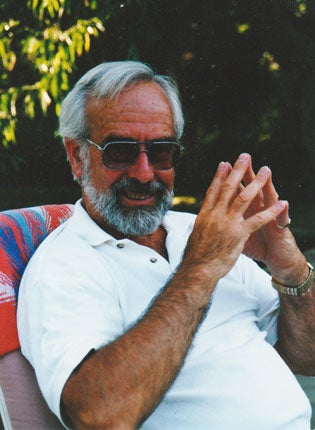Klaus Schiller: Pioneering physician and gastroenterologist

With the death of the eminent gastroenterologist, Dr Klaus Schiller, we have lost one of the last direct links with the intellectual life of pre-war Vienna.
His professional achievement was to pioneer, against concerted opposition, the use in Britain of endoscopes in gastroenterological investigations. But his seriousness of purpose, his commitment to the scientific method, and his broad cultural, social and family interests all spoke of a milieu and way of life that has all but disappeared.
Klaus Schiller was born in Vienna in 1927 to Walter, a gynaecologist, and Berta, the daughter of an industrialist. Following the Anschluss in 1938, his comfortable childhood was interrupted by enforced emigration and he was sent, with his sister, Verena, to England. Within a few days and with hardly a word of English, he found himself at boarding school in Bishop's Stortford. He always denied that this uprooting was traumatic and agreed with his friend, the late Professor Peter Scheuer, that "the best thing that ever happened to us was to come to England."
Klaus's parents and grandparents soon followed and he was sent to Clifton College. In 1945 he gained an Exhibition to read medicine at Queen's College, Oxford – a city that was important to him throughout his life. In 1948, he won a scholarship to the London Hospital, completing his clinical training in December 1951. He was appointed to two house officer posts at the London, and served two years national service, mostly as a medical specialist. After a clutch of junior positions elsewhere, he returned to the London as a registrar. He was appointed senior registrar at the Radcliffe Infirmary in 1962 and in 1966 received his doctorate. Eager to become a consultant, he spent a happy year at the Massachusetts General Hospital.
Returning to Oxford, Dr Schiller worked with his mentor and lifelong friend Dr Sidney Truelove. They undertook an in-depth survey of haematemesis and melaena, and the risky abdominal surgical interventions that were undertaken as a result. Truelove had acquired the first flexible fibre-optic gastroscope capable of taking biopsies under direct vision, and together they pioneered its early use. Some conservatives opposed them, but they soon demonstrated that it allowed for safe and non-invasive investigations that frequently obviated the need for surgery.
In 1967, Schiller was appointed consultant physician to St Peter's Hospital, Chertsey, where he developed a thriving endoscopy unit. His interest led him to make contact with other aspiring endoscopists and the formation of the British Society for Digestive Endoscopy (BSDE), an influential organisation that campaigned successfully for NHS support. With Truelove as president and Schiller as honorary secretary, training courses flourished and regular national and international conferences ensued.
While at St Peter's, Schiller found himself increasingly at odds with what he regarded as political and managerial interference. A passionate supporter of the founding ideals of the NHS, he had no time for Thatcherite fads: he refused to write a "mission statement", declaring that he was a doctor, not a missionary. Nevertheless, he made a major contribution to the growing reputation of the hospital, especially in gastroenterology and endoscopy. He also established a successful private practice.
Schiller was a remarkable stylist and wrote a number of papers and chapters in books, and edited and contributed to three endoscopy-related volumes. The most significant was A Colour Atlas of Gastroenterological Endoscopy (1986, revised 2002). The BSDE was subsumed into the BSG (British Society of Gastroenterologists) and Schiller was elected its vice-president.
Schiller was a man of wide-ranging interests. He had a passion for the natural world – the wildflowers of the Austrian Alps, migrating birds in Norfolk, and his garden in Oxfordshire. He was a member of Glyndebourne for more than 50 years and – to the dismay of some of his children – loved Wagner.
With his mane of white hair and trim beard, Schiller cut a somewhat daunting figure. A committed rationalist, he loved to engage in debate, and thought no subject unworthy of analysis. If his friends and family smiled at his jeremiads about the end of civilisation, they knew they were the product of deep feeling and careful thought. He despised the hypocrisy of politicians, marched against the Iraq war and supported Amnesty International. His deep commitment to science never conflicted with a sharp sense of the absurd. In his own words: "He had no God to thank but was nevertheless grateful".
Schiller was a devoted family man. His sister Verena, his wife, Judy, their children and grandchildren, as well as his many friends and colleagues, will long cherish the memory of his questioning eye, dry wit and charismatic, life-affirming personality.
Dr Klaus Frederick Richard Schiller DM FRCP: born Vienna 7 March 1927; senior registrar, Radcliffe Infirmary 1962-66; consultant physician and gastroenterologist, St Peter's Chertsey 1967-92; married 1961 Judy Bennett (three sons, one daughter); died Oxford 9 July 2010.
Subscribe to Independent Premium to bookmark this article
Want to bookmark your favourite articles and stories to read or reference later? Start your Independent Premium subscription today.

Join our commenting forum
Join thought-provoking conversations, follow other Independent readers and see their replies